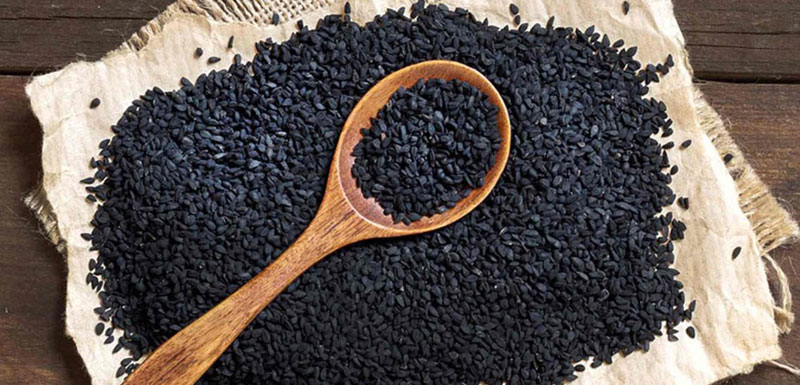Black Cumin Seeds: Information, Benefits & Side Effects

Black cumin seed is derived from a plant with the botanical name Nigella sativa. The seeds of the Nigella sativa plant are black in color and look something like sesame seeds.
Both the seeds and seed oil are used as nutritional supplements.
Black cumin seed (also known as “black seed”) has been consumed for centuries, especially in the Middle East and Southeast Asia.
Known by various names such as “Habat-Ul-Sauda” and “Kalonji”, it’s both a spice and traditional medcine used to treat a range of hepatic and digestive disorders, as well as fever, headaches and skin diseases.
Science and Research
Research on black cumin seed is both prolific… and frustrating. There is no doubt that it contains biologically-active components… there are a large number of in-vitro and animal experiments that highlight its potential.
As noted in a recent editorial, black cumin seed and/or its components exhibit…
“…a number of pharmacological effects of profound therapeutic value, like: Analgesic, anti-inflammatory, antihistaminic, anti-allergic, anti-oxidant, anti-cancer, immune stimulation, anti-asthmatic, antihypertensive, hypoglycemic, anti-bacterial, antifungal, anti-viral and anti-parasitic.”
Yet there are very few clinical trials that demonstrate—beyond a doubt—that it’s useful for preventing/treating disease in human beings. Likewise, there’s little to suggest it’s superior to other biologically active, traditional herbs/spices or even conventional medicines.
Thus, while the research record is tantalizing, it stops short of validating the claims made for it by proponents who insist it can treat/prevent cancer, autoimmune disorders, respiratory diseases and skin conditions.
As one recent (2008) review put it:
“Black cumin seed (Nigella sativa) oil extracts have been used for many centuries for the treatment of many human illnesses, and more recently the active compound found in black seed oil, viz. thymoquinone (TQ) has been tested for its efficacy against several diseases including cancer. However, further research is needed in order to assess the full potential of TQ as a chemopreventive and/or therapeutic agent against cancers.”
Emphasis mine.
Not one human trial is cited amongst the 96 references covered in this (very extensive) review. They’re pretty few and far between.
This is what makes it difficult to assess the true value of black seed as a supplement.
Human clinical trials are important, as compounds consumed orally may not yield the same results as those added directly to isolated cells/tissues, or injected directly into animal tumors.
Absorption and metabolism affects how much of an ingested compound reaches the target tissue(s), assuming that it does so at all.
When it comes to treating/preventing serious diseases such as cancer, this can make all the difference in the world.
I was able to come up with only two human studies on Nigella sativa oil:
a) one describing how 40mg/kg–80mg/kg of oil improved allergy sufferers’ (self-reported) severity of symptoms; and b) another showing that 5g of oil improved fasting blood glucose and total/LDL cholesterol, when taken by diabetic subjects in conjuction with standard therapy (atorvastatin and metformin). Neither study appeared to be placebo-controlled.
To make a long story short, although black cumin seed looks quite promising, a lot more work needs to be done before it can be recommended as a therapeutic agent for specific diseases/conditions.
Black Cumin Seeds Safety and Side Effects
Of course, black cumin seed is a food as well as a traditional medicine, and—as such—it appears to be both nutritious and non-toxic.
Thus, for those interested in experimenting with it, there are few problems assocated with consuming the seeds or oil.
Avoid If Pregnant
Nonetheless, black seed products should be avoided by pregnant women, as one of the traditional uses is to induce abortion. The oil can also be used topically, although contact dermatitis is a (remote) possibility.
Online, iHerb.com carries both the powder form as well as the cold pressed oil of black cumin seeds.



May 16, 2014
Will You please s’end à catalogue @
5229 Riverside avé apt 2
San Pablo ça 94806
May 16, 2014
We don’t sell products (this is a review site only), so we don’t have a catalog to send to you. Sorry!
February 20, 2015
Thank you for the review. I found it both informative and thorough. I think I will hold off for a while on my purchase of black cumin products.
June 23, 2017
This morning is uses black seed oil as oil pulling, but the srltrangest thing happen to me, i accidentally swollled it, and it have my throat burning me, i really find the product very good, it help me with some of my issues. I take it with honey some time, but its the first i have experience such. Advise please